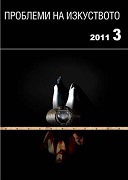90-те: Режисьорът се завръща. Краят на фигуративната режисура
The 1990s: The Director Comes back
Author(s): Violeta DechevaSubject(s): Theatre, Dance, Performing Arts
Published by: Институт за изследване на изкуствата, Българска академия на науките
Summary/Abstract: After the 10th of November 1989 the secretary General of the Communist Party Todor Zhivkov was replaced and the communist state began disintegrating. The National Theatre was looked upon as a symbol of official socialist culture so it was subjected to more violent attacks than the other theatres were and it soon collapsed. Diko Foutchadzhiev with drew at the beginning of the 1990- 1991 season and the drama specialist Prof. Vasil stefanov was appointed in his place. In spite of the difficult situation in which the Theatre was, the new management took adequate meas- ures and it began to come out of the crisis. The experimental “sfumato” Theatre was invited to work under the roof of the National Theatre. Its directors Margarita Mladenova and Ivan Dobchev became full-time members of the Theatre. Thus a strong team of directors. The directors Leon Daniel, Krikir Azaryan and Krasimir spasove produced a number of plays. M. Minkov’s The Fireplace and samuel Beckett’s Krapp’s Last Tape were directed by Krikor Azaryan, Arthur Miller’s The Price by Leon Daniel, Gorky’s Vasa Zheleznova - 1910 by Kr. spasov, Memories of a Revolution after Büchner and Müller and easter Day Wine by Konstantin Iliev were directed by Ivan Dobchev, Lorenzacco by Alfred de Musset, At the Foot of Mount Vitosha by Yavorov and Nirvana by Konstantin Iliev were directed by M. Mladenova. These were powerful performances not only in the context of the Theatre. In the first half of the 90s the work of the mentioned directors restored the National Theatre’s leading position in the theatrical world of the country. Lorenzacco was declared to be the best play for the 1991-1992 season. At the beginning of 1993 Alexander Morfov was appointed director and his very first produc- tion Don Quixote by Cervantes which, together with easter Day Wine and “sfumato’s” uncle Vanya dominated as plays of the season. These were three very different productions yet they were all original and moving. They were impressive aesthetic reevaluations of the experiences under the changes and the memories of the past. They all gave the Theatre, regarded until only a few years earlier as most conservative, a new image and brought to its auditorium a new kind of audience. The National Theatre realized the ambition to become the centre of what was the best and the most interesting in the theatrical life of the country.
Journal: Проблеми на изкуството
- Issue Year: 2011
- Issue No: 3
- Page Range: 30-33
- Page Count: 4
- Language: Bulgarian
- Content File-PDF

